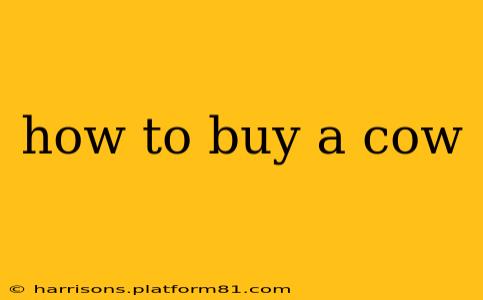Buying a cow can be a rewarding experience, whether you're starting a small farm, seeking fresh milk, or simply want a friendly bovine companion. However, it's a significant decision that requires careful planning and research. This guide will walk you through the process, addressing common questions and concerns.
What Kind of Cow Should I Buy?
This depends entirely on your goals. Are you looking for milk production? Beef? A dual-purpose breed? Or perhaps just a pet? Different breeds excel in different areas. Dairy breeds like Holsteins and Jerseys are known for high milk yields, while beef breeds like Angus and Hereford are prized for their meat quality. Smaller breeds like Dexter cattle are suitable for smaller properties. Researching various breeds and their characteristics is crucial before making a purchase. Consider your climate, available land, and personal preferences when choosing a breed.
Where Can I Buy a Cow?
Several avenues exist for purchasing a cow:
- Local Farmers and Ranchers: This is often the best option, allowing you to inspect the animal's health and temperament firsthand. You can often build a relationship with the seller, gaining valuable advice and support.
- Livestock Auctions: Auctions can offer good deals, but require knowledge of livestock valuation and careful inspection to avoid buying an unhealthy animal. Be prepared for a competitive bidding environment.
- Online Classifieds and Marketplaces: Websites and online marketplaces dedicated to livestock sales are convenient but lack the personal interaction of buying locally. Thorough research and verification of the seller's legitimacy are essential.
- Breed Associations: Many breed associations maintain lists of breeders, often providing helpful information about specific breeds and their characteristics.
How Much Does a Cow Cost?
The price of a cow varies significantly based on breed, age, health, and its intended purpose. A young, healthy heifer (a female cow that hasn't yet calved) will generally cost less than a mature, proven milk cow. Beef cattle prices fluctuate with market demand. Expect to pay anywhere from a few hundred dollars for a less desirable animal to several thousand dollars for a high-quality, registered animal.
What Should I Look for When Inspecting a Cow?
Careful inspection is vital to avoid purchasing an unhealthy or unsuitable animal. Look for:
- Body Condition: A healthy cow should be well-muscled and have a good fat cover. Avoid animals that appear thin or emaciated.
- Coat Condition: The coat should be smooth, shiny, and free from parasites. Dull or patchy fur could indicate illness or poor nutrition.
- Eyes and Mucosa: Bright, clear eyes and healthy pink gums are signs of good health. Pale gums or cloudy eyes could signify illness.
- Temperament: Observe the cow's behavior. A docile temperament is generally preferred, especially if you're a first-time owner.
- Udder (for Dairy Cows): The udder should be well-formed, free from lumps or sores, and easily emptied.
What are the Ongoing Costs of Owning a Cow?
Owning a cow involves ongoing expenses beyond the initial purchase price:
- Feed: Providing adequate nutrition is crucial. This includes hay, grain, and potentially supplements.
- Veterinary Care: Regular checkups, vaccinations, and potential treatments for illness are necessary.
- Housing and Fencing: You'll need appropriate housing and secure fencing to protect your cow.
- Manure Management: Proper manure disposal is important to maintain hygiene and prevent environmental problems.
How Do I Transport a Cow?
Transporting a cow requires a suitable trailer and careful handling. Ensure the trailer is appropriately sized and secured to prevent injury during transport. Seek professional help if you lack experience in transporting livestock.
What Legal Considerations Should I Be Aware Of?
Depending on your location, specific regulations and permits may apply to owning livestock. Check with your local authorities to understand any legal requirements.
By carefully considering these factors, you can make an informed decision and enjoy the rewards of owning a cow. Remember that buying a cow is a commitment requiring time, resources, and ongoing care.
